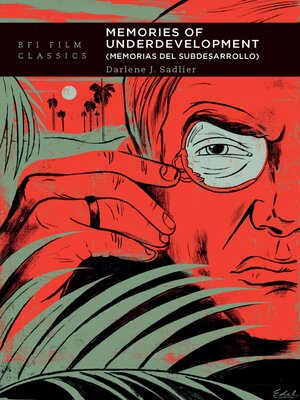Memories of Underdevelopment
ebook ∣ Memorias del Subdesarrollo · BFI Film Classics
By Darlene J. Sadlier

Sign up to save your library
With an OverDrive account, you can save your favorite libraries for at-a-glance information about availability. Find out more about OverDrive accounts.
Find this title in Libby, the library reading app by OverDrive.



Search for a digital library with this title
Title found at these libraries:
| Library Name | Distance |
|---|---|
| Loading... |
Tomás Gutiérrez Alea's Memories of Underdevelopment (1968) is a classic of Cuban revolutionary culture, and is hailed as a prime example of a radical style of 1960s political filmmaking that became known worldwide as Latin American "new cinema."
Darlene J. Sadlier's detailed study approaches this much-written-about film from a new perspective. Her analysis situates the film in its historical context, considering how Cuban political history affected and informed the production of the film, particularly its use of archival footage. She discusses the film as an adaptation of Edmundo Desnoes's novel Memorias del subdesarrollo (1965), exploring how the novel itself is "re-written" in significant ways by the film.
Sadlier goes on to analyse the curious opening of the film on an outdoor scene of Afro-Cubans dancing to the "new" music of Pello del Afrokán, arguing that this opening scene prefaces the film's exploration of both class and race. She focuses on the unique style of the film, particularly the use of voiceover, music and documentary footage to show how the themes of ennui, isolation, writing, and remembering are depicted. In doing so, she highlights the film's lasting impact and its role in defining Latin American "new cinema".
Darlene J. Sadlier's detailed study approaches this much-written-about film from a new perspective. Her analysis situates the film in its historical context, considering how Cuban political history affected and informed the production of the film, particularly its use of archival footage. She discusses the film as an adaptation of Edmundo Desnoes's novel Memorias del subdesarrollo (1965), exploring how the novel itself is "re-written" in significant ways by the film.
Sadlier goes on to analyse the curious opening of the film on an outdoor scene of Afro-Cubans dancing to the "new" music of Pello del Afrokán, arguing that this opening scene prefaces the film's exploration of both class and race. She focuses on the unique style of the film, particularly the use of voiceover, music and documentary footage to show how the themes of ennui, isolation, writing, and remembering are depicted. In doing so, she highlights the film's lasting impact and its role in defining Latin American "new cinema".







